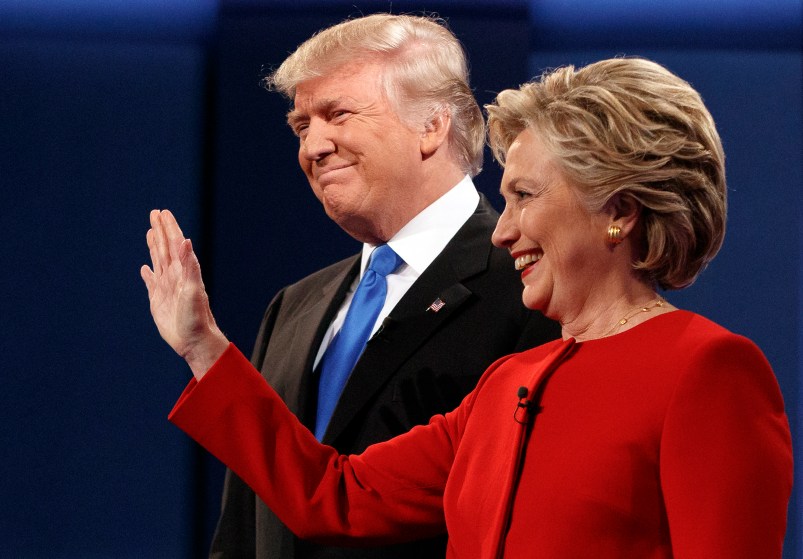Several of us have criticized the Clinton campaign for relying on identity politics. Mark Lilla’s essay in the New York Times sparked the most fervent reaction. I want to discuss one of the calmer, but no less wrong-headed, responses that seems prevalent among Vox’s editors. Matthew Yglesias, David Roberts, and now Sean Illig have made the point, in Yglesias’s words, that “there is no other way to do politics than to do identity politics.” In other words, all politics is identity politics.
It may seem implausible to attribute a political mistake to bad grammar, but in this case, the Vox writers make a simple grammatical error. They fail to understand that “identity politics” is a phrase in which the adjective is inseparable from the noun. Its grammar is similar to the term “mental error.” One can say all errors are mental, and similarly one can say that all politics is based on identity – after all everyone has an identity – but that is to allow the adjectives “identity” and “mental” a life of their own separate from the nouns to which they are conjoined.
Identity politics is a specific political practice that originated in the new left during the last 1960s, was a subtext of the McGovern campaign in 1972 and the Mondale campaign in 1984 – described in a 1984 New Republic article by Sidney Blumenthal, “Walter Mondale’s Days of Rage” — was unintentionally given new life by Ruy Teixeira and my book, “The Emerging Democratic Majority,” was codified by pollsters Stanley Greenberg and Celinda Lake in the wake of the Democrats’ 2008 sweep, and on the eve of the Clinton campaign, had taken hold among the various Democratic political and policy groups in Washington and New York. It consisted of creating a majority by specifically winning over the groups that had turned toward the Democrats since the early ‘60s, including blacks, Latinos, women (and single women in particular), and the young.
I got my first inkling of identity politics when Tom Hayden and Todd Gitlin visited our SDS chapter in Northern California in January 1969. The revolution was nigh, Hayden explained (I’m quoting from memory here), because “we already have the students, the women, the blacks, and the browns.” We repeated a version of that argument in our opening editorial in January 1970 for Socialist Revolution, a journal I worked on. We called it the “invisible majority.” There was not a lot of difference between what we were talking about then and Greenberg, Lake et al.’s concept of a “rising American electorate” or “new majority.”
In The Emerging Democratic Majority, Ruy and I described the political shift toward the Democrats of these groups, including professionals, which most of the recent theorists strangely omit (too high up on the class ladder?), but we didn’t endorse a politics based on rounding up these groups in an electoral corral. Instead, we tried to conceive of an overall politics that would unite these groups and maintain the Democrats’ hold on half of the white working class. With the post-2008 consultants and the Clinton campaign, our demographic projections congealed into a politics designed to win elections. That’s identity politics.
Bill Clinton did not practice identity politics in 1992; nor did Barack Obama in 2008 and 2012. Nor have most Republicans. Some liberals have charged that Trump’s campaign was based on “white” identity politics. I consider that to be a case of either grammatical sloppiness or projection. Trump did have a following among fringe groups that extol and defend whiteness, and liberal cryptographers were able to find occasional twitter statements and the like that spoke to these groups, but Trump’s campaign was thematically centered on the slogan “Make America Great Again.” Its appeal was nationalist. When I explained this to one interviewer, he responded, “But nationalism is a form of identity politics.” That’s a misuse of the term. It’s allowing “identity” to go on a linguistic holiday. Is a concern about global warming planetary identity politics?
In Clinton’s case, even when she tried to sum up her campaign thematically, she invoked identity politics. “Stronger together” and “inclusivity” conjured up an image of the different groups gathered together and stronger together than they were by themselves. I am not going to repeat arguments here that this kind of identity politics is not a path to a Democratic majority – the results are clear in Clinton’s failure to defeat a remarkably flawed Republican opponent. In this brief note, I just want to make clear that it’s not an adequate response to the critics of this politics to say, as the editors of Vox do, that all politics is identity politics.






